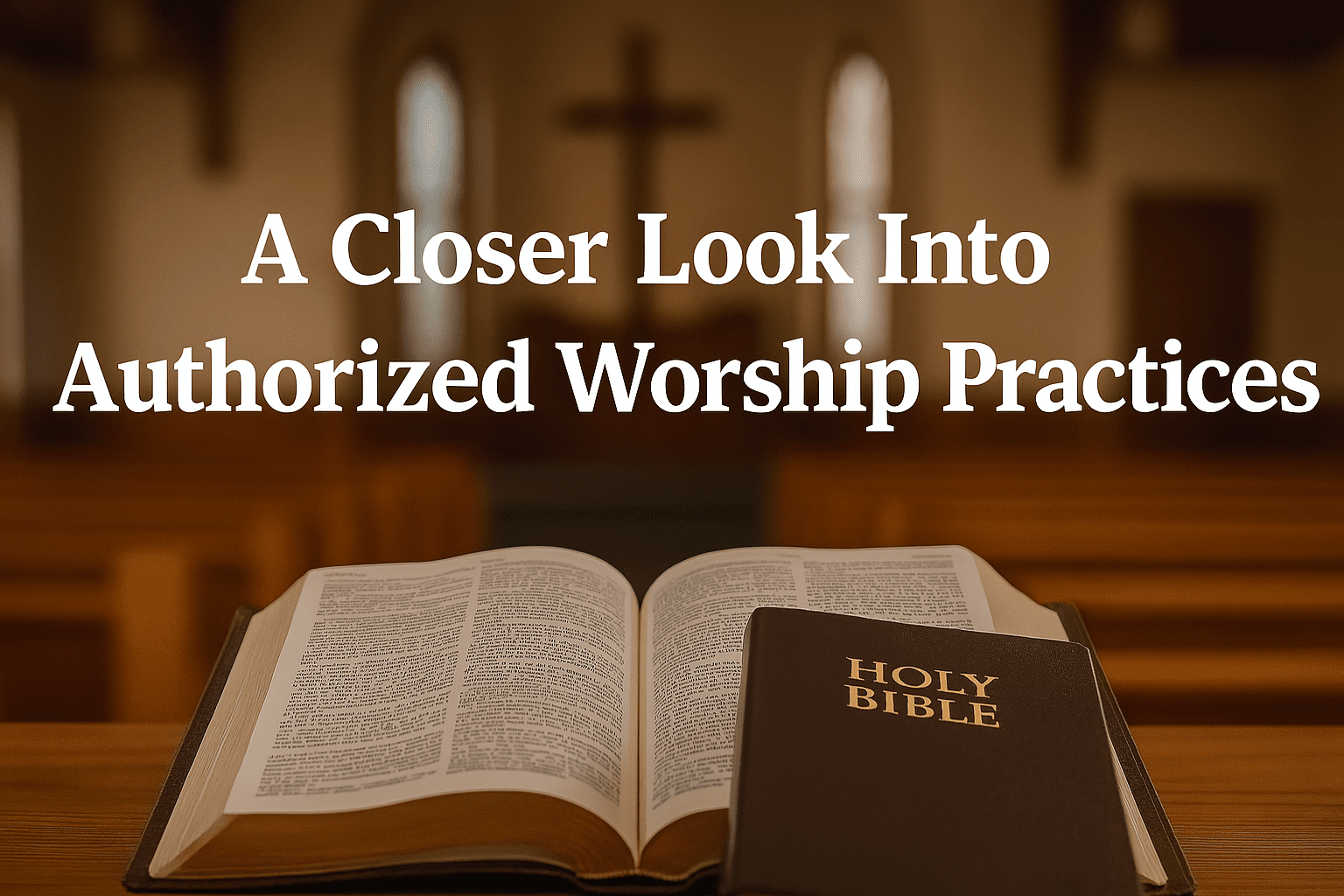Understanding What God Accepts in New Testament Worship
Worship is not just a religious routine—it is a sacred offering directed to Almighty God. To worship acceptably, we must seek not what we prefer, but what God has authorized. Many today engage in worship designed to entertain or follow long-standing traditions, but Jesus made it clear:
“God is Spirit, and those who worship Him must worship in spirit and truth.”
— John 4:24
Let’s take a closer look at authorized worship practices, as revealed in the New Testament, and why it’s essential that we follow God’s pattern.
What Does “Authorized Worship” Mean?
To be “authorized” means it’s approved by the proper authority. In all spiritual matters, Jesus Christ has been given all authority (Matthew 28:18), and His will is revealed in the New Testament (Hebrews 1:1–2).
“And whatever you do in word or deed, do all in the name of the Lord Jesus…”
— Colossians 3:17
This means that everything in worship must be done by the authority of Christ—not by tradition, human opinion, or popularity.
Five Authorized Acts of Worship in the New Testament Church
In the early church, Christians gathered on the first day of the week to worship God (Acts 20:7). Here are the five acts that were consistently practiced—authorized by God and recorded in Scripture:
1. 🎵 Singing (A Cappella Music)
“Speaking to one another in psalms and hymns and spiritual songs, singing and making melody in your heart to the Lord.”
— Ephesians 5:19
New Testament Christians sang praises without instruments. No example exists of the early church using mechanical instruments in worship. The melody is made in the heart, not on strings. Instrumental music was introduced centuries later by man—not by Christ—making it unauthorized in worship today.
2. 🙏 Prayer
“They continued steadfastly in… prayers.”
— Acts 2:42
Prayer was a central part of worship. In public worship, men are to lead the congregation in prayer (1 Timothy 2:8). These prayers included thanksgiving, supplication, and intercession, and were offered sincerely and reverently.
3. 📖 Teaching and Preaching the Word
“Preach the word! Be ready in season and out of season.”
— 2 Timothy 4:2
Worship includes the public reading, teaching, and preaching of God’s Word. This builds up the church (1 Corinthians 14:26) and keeps believers grounded in sound doctrine.
4. 🍞 The Lord’s Supper
“Now on the first day of the week, when the disciples came together to break bread…”
— Acts 20:7
The Lord’s Supper is a weekly memorial. The unleavened bread represents Christ’s body; the fruit of the vine represents His blood. Instituted by Jesus (Luke 22:19-20), it is not to be altered or taken lightly (1 Corinthians 11:23-29).
5. 💰 Giving
“On the first day of the week let each one of you lay something aside, storing up as he may prosper…”
— 1 Corinthians 16:2
Christians are to give willingly, cheerfully, and as they’ve prospered (2 Corinthians 9:7). Giving is an act of worship—not a tax or tithe (which belonged to the Old Law). It supports the work of the church, benevolence, and evangelism.
Worship Must Be in Spirit and Truth
Jesus taught that both the heart and the pattern matter:
- In spirit = with sincerity, reverence, and love for God.
- In truth = according to God’s revealed Word.
“In vain they worship Me, teaching as doctrines the commandments of men.”
— Matthew 15:9
Man-made worship—no matter how beautiful or moving—can be vain if not based on truth. God will not accept what He has not commanded.
Why Unauthorized Worship Is Spiritually Dangerous
Examples like Cain (Genesis 4), Nadab and Abihu (Leviticus 10:1–2), and Uzzah (2 Samuel 6:6–7) show that God does not accept “close enough” when it comes to worship. If it’s not authorized, it’s not acceptable.
“Do not add to His words, lest He rebuke you, and you be found a liar.”
— Proverbs 30:6
What About Modern Innovations in Worship?
Many churches today incorporate:
- Instrumental music
- Drama and entertainment
- Women leading in worship
- Weekly communion replaced with monthly or quarterly observance
- Worship centered on emotional experiences rather than doctrine
But none of these are authorized in the New Testament. We must return to the simplicity and purity of New Testament worship if we truly want to please God.
The Early Church’s Pattern—And Ours Today
The first-century church:
- Met every first day of the week (Acts 20:7)
- Sang without instruments (Ephesians 5:19)
- Partook of the Lord’s Supper weekly (Acts 20:7)
- Gave as they prospered (1 Corinthians 16:2)
- Taught the apostles’ doctrine (Acts 2:42)
- Prayed regularly (Acts 2:42)
This is the authorized pattern, and it is timeless. God has not changed, and neither has the pattern of acceptable worship.
Final Thoughts: Is Your Worship Aligned With God’s Will?
The question is not, “Did I enjoy worship?”, but rather, “Did God accept it?”
Worship must be based not on personal taste, family tradition, or popular trends—but on book, chapter, and verse.
Let us be a people who seek to worship God His way, every time.
“Let us offer to God acceptable worship, with reverence and awe, for our God is a consuming fire.”
— Hebrews 12:28–29


0 comments